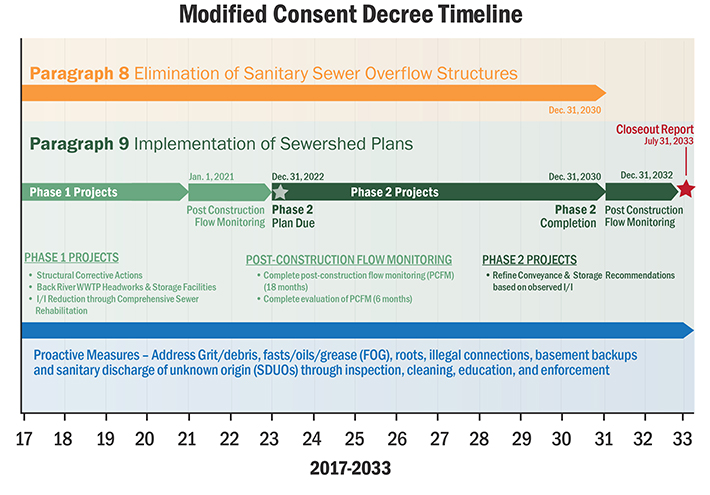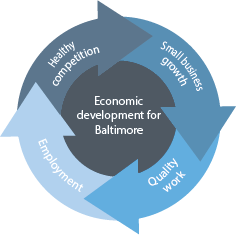


Like most large cities, Baltimore faces the challenges of aging infrastructure. On September 30, 2002, the City entered into a Consent Decree (CD) with the U.S. Environmental Protection Agency, U.S. Department of Justice, and Maryland Department of the Environment to address sanitary sewer overflows from the City’s sanitary sewer collection system, which are violations of the Clean Water Act. To resolve these issues, the Baltimore City Department of Public Works (DPW) performed a comprehensive study of the collection system and produced a sewershed plan to fix issues identified during the study. In addition, DPW designed or completed major 23 capital projects, closed 60 of 62 identified structured overflows, and separated the combined sewer system. Finally, DPW discovered a hydraulic restriction in the collection system and designed the Headworks project to upgrade the City’s Back River Wastewater Treatment Plant (WWTP) to address the restriction. Recognizing that additional time and resources were required to complete this work, the United States, State of Maryland, and the City negotiated a modification to extend the 2002 CD beyond its January 1, 2016, deadline. On October 6, 2017, the U.S. District Court entered a Modified CD with all projects scheduled for completion by December 31, 2030.
2002 Sanitary Sewer Consent Decree
MODIFIED CONSENT DECREE
The Modified CD has two (2) phases. Phase I prioritizes environmental and social benefits by addressing the remaining issues identified during the sewershed studies and constructing the Back River WWTP Headworks project. These measures will eliminate an estimated 83% of sanitary sewer overflow volume by January 1, 2021. Phase II upsizes the collection system to achieve a 5-year level of protection throughout the City, and a 10-year level of protection in sensitive areas by December 31, 2030. DPW will monitor the success of each phase to ensure the City’s sewer infrastructure is optimally sized based on actual performance. DPW will continue to implement proactive measures for the collection system to address grit/debris, fats/oils/grease, roots, illegal connections, and sanitary discharges of unknown origin through inspection, cleaning, education, and enforcement. Additionally, the Modified CD includes measures regarding basement backups, water quality monitoring, and transparency. These measures include an Expedited Reimbursement Program to reimburse City homeowners up to $2,500 per dwelling, per occurrence for documented disinfection and cleaning costs when a backup is the result of surcharging in the collection system caused by wet weather events. The program will begin in April 2018.

LOCAL ECONOMIC DEVELOPMENT
The Consent Decree is an investment in the future of our City, economy, and environment. These investments are also an  opportunity for local residents and businesses. DPW is doing its part by training local, minority, and women-owned businesses to compete for City construction contracts. The goal is to create a diverse and inclusive group of small businesses that are prepared to do business with the City. Achieving this goal will expand the pool of talent available to provide services and increase competition, placing downward pressure on costs while benefiting ratepayers and the local economy.
opportunity for local residents and businesses. DPW is doing its part by training local, minority, and women-owned businesses to compete for City construction contracts. The goal is to create a diverse and inclusive group of small businesses that are prepared to do business with the City. Achieving this goal will expand the pool of talent available to provide services and increase competition, placing downward pressure on costs while benefiting ratepayers and the local economy.
DPW launched its Small Business Development Program in 2016. The program provides an intensive 10-week training course to advance participants’ knowledge of construction management. Participants emerge from this training with an arsenal of information on project management, scheduling, accounting, construction industry best practices, estimating and bidding, and marketing.
DPW’s capital infrastructure program is a driving force for economic growth throughout the City. The Small Business Development Program illustrates how the Mayor’s strong leadership and DPW’s sound stewardship of public resources ensures that the entire community benefits from these investments long into the future.